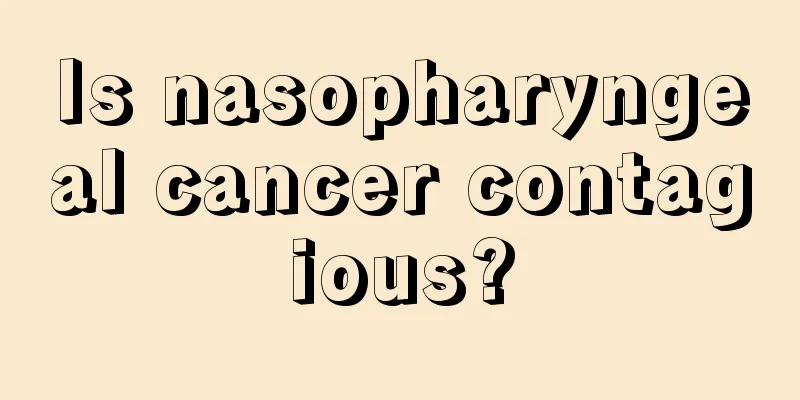Is nasopharyngeal cancer contagious?

|
Is nasopharyngeal cancer contagious? Nasopharyngeal cancer is a disease that troubles many patients and many families. Many people are worried about whether nasopharyngeal cancer is contagious. Experts point out that the so-called transmission means that a disease is transmitted from one person to another through some means. Infection requires three conditions: infection source, transmission route and susceptible population. Clinical data prove that cancer patients themselves are not infection sources. This means that nasopharyngeal cancer is not contagious. Experts have conducted experiments in which cancerous tissue removed from a cancer patient was directly implanted in another person and failed to survive and grow. Animal experiments have also proven that when cancerous animals and healthy animals were kept together for a long time, no infection was observed after repeated observation and examination. This also proves from a certain perspective that nasopharyngeal cancer is not contagious. In addition, cancer is not currently listed as an infectious disease in the world, and patients are not isolated as infectious diseases. The incidence of cancer among medical staff is not higher than that of the general population. Although it is currently believed that the occurrence of certain cancers is related to certain viruses, such as cervical cancer, nasopharyngeal cancer, and leukemia, it has not yet been confirmed that infection with certain viruses will definitely lead to certain cancers. Nasopharyngeal cancer itself is not a source of infection and is not contagious. However, studies have found that most patients with nasopharyngeal cancer carry a virus called Epstein-Barr virus, commonly known as the "kissing virus," which is an important killer that causes nasopharyngeal cancer. EB virus is transmitted through saliva exchange, and kissing is the most common way of transmission. Other transmission routes include sneezing, coughing, sharing of tableware and blood transfusion. The infected person will have a headache, fever, liver enlargement, dehydration, and diarrhea. The symptoms usually last for 2 to 4 weeks, but those with poor immunity will have symptoms for longer. This virus is more common in young people around 20 years old, so experts remind people not to kiss strangers to reduce the chance of nasopharyngeal cancer. Nasopharyngeal carcinoma is not contagious like other pathogens. The presence of Epstein-Barr virus can aggravate the occurrence of nasopharyngeal carcinoma, but it does not fundamentally prove that nasopharyngeal carcinoma is contagious. |
<<: Is nasopharyngeal cancer contagious to others?
>>: Can couples with nasopharyngeal cancer infect each other?
Recommend
What should I pay attention to when filling my forehead with autologous fat
Autologous fat filling is a very popular cosmetic...
Is heart rate 56 normal but healthy
Heart rate is an important criterion for measurin...
Can Houttuynia cordata tea help lose weight?
I believe many people have heard of drinking Hout...
What causes cramp pain behind the ear
Few people probably pay attention to the skin beh...
Sweating at night
With the continuous development of modern industr...
How to wash silk clothes, the correct way to wash silk clothes
Silk is a clothing material that is more popular ...
Is it good to digest quickly?
After we finish eating, our body will automatical...
What are the treatments for laryngeal cancer
What are the treatments for laryngeal cancer? The...
Is glioma a common disease?
Glioma is one of the common tumor types of the ce...
Is using a mud rubbing machine harmful to the body?
Maybe people in the south seldom scrub their bodi...
What does platelet antibody mean
When examining platelets, platelet antibody testi...
How to Kill Bed Bugs
Bed bugs are blood-sucking creatures. They have s...
If ulcers recur, just press one spot
(Chen Miao, Run Run Shaw Hospital, Zhejiang Unive...
How to treat hallux valgus
Some people have hallux valgus, but some people h...
Lymph nodes under the cheeks
The doctor told me that the lymph under the cheek...









